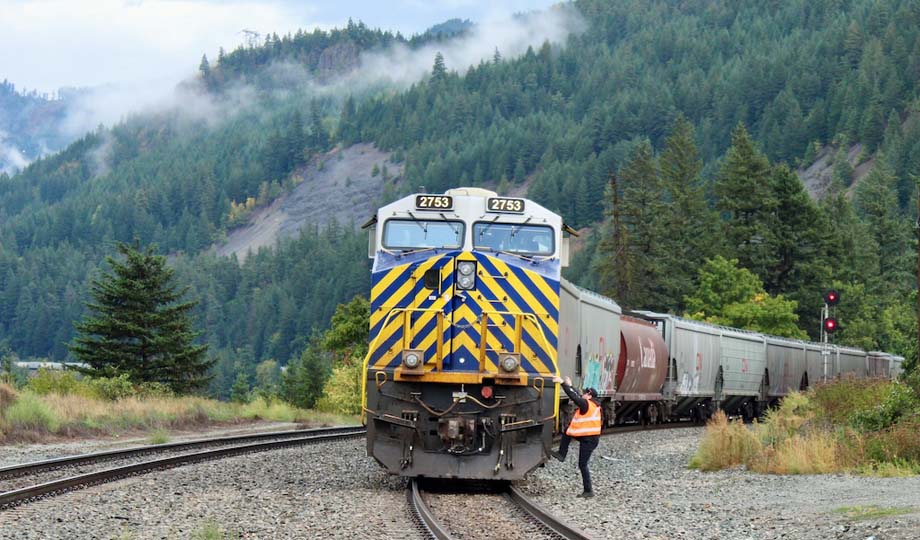
Canada - CN is confident that it has the resources necessary to handle this year's grain harvest in
Canada, which is expected to be larger than average, but says it has concerns about several issues that could crimp
capacity.
In its annual grain plan released today, CN warns that its main grain-hauling route between Edmonton and Vancouver may
be at or above its overall capacity at times during the fall and into early next year, while its route to Prince
Rupert may sometimes operate at capacity.
In addition, new capacity constraints may crop up in Vancouver due to the April completion of the Trans Mountain
pipeline, which has increased fuel exports through Canada's busiest port.
CN says its Second Narrows lift bridge over the Burrard Inlet, which leads to and from grain export terminals on
Vancouver's North Shore, must be raised more often to accommodate increased marine tanker traffic.
And that, CN says, will contribute to increased transit times for grain trains.
"CN is monitoring TMX vessel traffic impacts and working closely with customers to maintain supply chain fluidity
and maximize capacity. CN is engaged with the Port of Vancouver and the Government of Canada on this issue. Our goal is
to reduce the unpredictability of the impact to bridge operations and ensure that both rail and marine traffic can
maximize their volumes," the report says.
CN urges grain producers to consider using routes that have ample capacity, such as its main lines to export terminals
in Thunder Bay Duluth, Minnesota, and on the St. Lawrence Seaway in Eastern Canada.
Shippers also could take advantage of Prince Rupert when the BC North line is operating below capacity.
"Corridor balance is required to maximize supply chain capacity and throughput," CN says.
CN says that it's concerned about potential negative impacts from new federal labour regulations, extended
interswitching rules, and the inability of Vancouver export terminals to load vessels in rainy weather.
"As we look to the new crop year, one real challenge for CN is the availability of labour, specifically the
operating crews that run our trains. This is a result of overall Canadian labour market conditions and low unemployment
rates coupled with the real impact of federal labour regulations that came into effect in May 2023 that requires
approximately 15 percent more people to move the same amount of freight," CN CEO Tracy Robinson
wrote.
The railway has increased its focus on crew hiring and retention, she says.
CN also says 2023 extended interswitching rules have reduced capacity and efficiency and should not be renewed beyond
their scheduled March 2025 expiration date.
The rules frequently result in longer routes that extend cycle times and require more covered hoppers to handle the
same amount of volume.
Finally, CN encouraged the Canadian government to resolve the long-standing issue of West Coast ports not being able to
load grain vessels while it's raining.
"Heavy, persistent, rainfall occurs at Canada's West Coast ports every year. Like clockwork, every time it rains,
grain movement slows down at terminals. However, rain is a solvable problem, and wet weather should not impact modern
grain terminal operations on the West Coast of Canada. Operational and infrastructure solutions to this problem are in
place in the U.S. Pacific Northwest, which is an area with the exact same issue. Rain should not reduce supply chain
capacity, especially in Vancouver where capacity is limited, and inefficient operations have a negative effect on the
entire supply chain," the railway says.
The crop year runs from 1 Aug 2024, to 31 Jul 2025.
During the last crop year, CN handled an all-time monthly grain tonnage record in February.
CPKC, which also released its grain plan today, echoed CN's concerns about labour, extended interswitching, and the
impact of wet weather on ship loading in Vancouver.
"The federal government can show leadership by addressing these key, avoidable constraints on the overall
performance and export capacity of Canada's grain supply chain," CPKC said.
CPKC's grain plan put more emphasis on the potential impact of a looming strike by members of the Teamsters Canada Rail
Conference, which represents the railway's engineers, conductors, and rail traffic controllers in Canada.
CN also has yet to reach an agreement with the TCRC.
"CPKC is well-positioned to supply the transportation capacity to move Canada's grain and grain products
throughout the duration of the 2024–2025 crop year. However, the threat of a TCRC work stoppage in the coming weeks or
months could negatively impact grain supply chain performance during the upcoming crop year," the railway
says.
After two years of below average grain harvests in its service territory on the southern Canadian Prairies, CPKC
expects a return to more typical demand this year.
CPKC expects to be able to meet that demand, but warned that shippers should take advantage of capacity when it's
available.
"Unused rail capacity for grain transportation was a key feature of the 2023–2024 crop year. In fact, more than
8.8 MMT of capacity for Canadian grain transportation on the CPKC rail network went unused during this past crop
year. This equates to approximately one quarter of the capacity CPKC had available relative to the supply targets
outlined in last year's grain report. Capacity cannot be saved up and used later, capacity unused in the week it is
available is lost capacity that cannot be recovered," the railway said.
CPKC noted that the CP-KCS merger has offered Canadian grain producers new single line routes to the U.S. Gulf Coast
and destinations in Mexico.
"The increased destination optionality afforded to Canadian grain shippers allows them to further penetrate
markets and realize opportunities beyond the traditional Vancouver and Thunder Bay export programs," the railway
said.
Bill Stephens.
(likely no image with original article)
(usually because it's been seen before)
provisions in Section 29 of the
Canadian Copyright Modernization Act.
